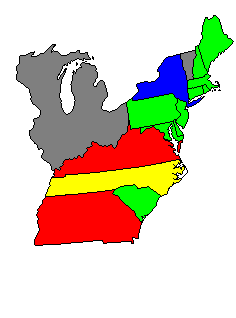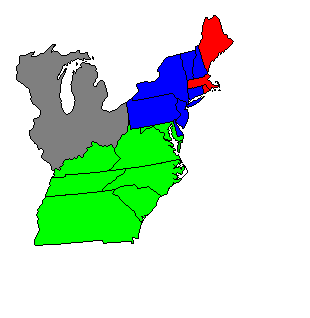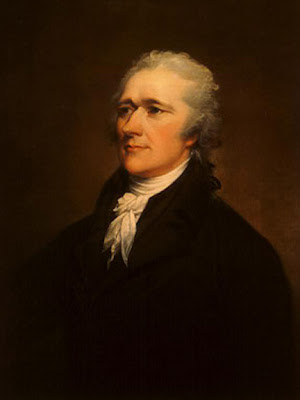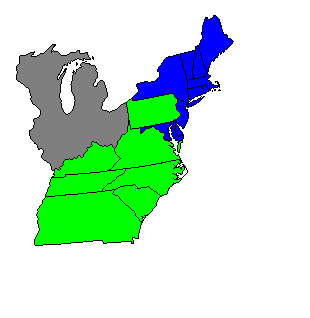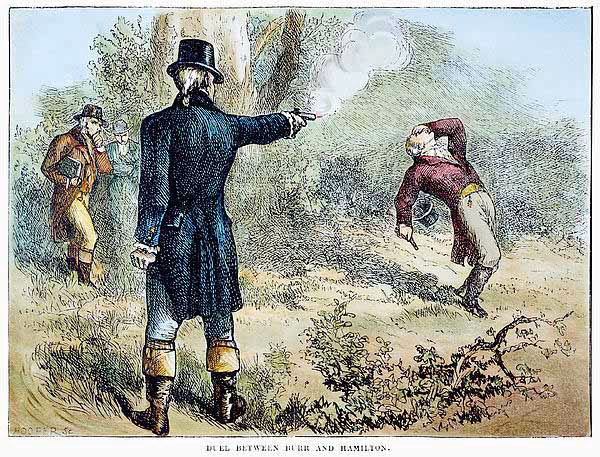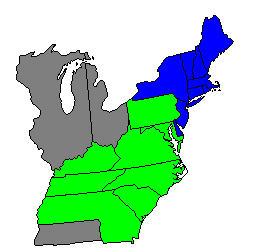Chapter 1: Building A Nation (1786-1797)
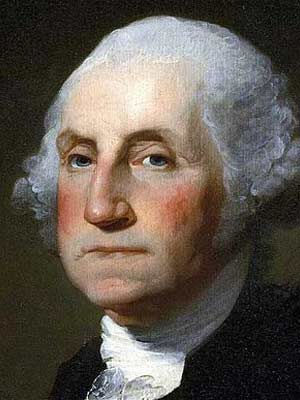



God Save That Yankee King
Part 1: The Convention and the Hurdles of Ratification
1786-1788




God Save That Yankee King
Part 1: The Convention and the Hurdles of Ratification
1786-1788
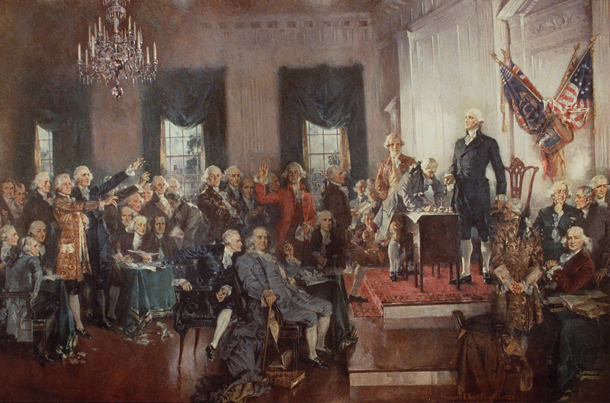
Debating on the Convention floor
"Why must we throw off a tyrant only to replace him with what could be another one? Was our Revolution in vain? Our Articles a waste? No, my fellow delegates and if we adopt the monarchy our government won't be a government for all but instead a government for one."- Thomas Jefferson in a letter to the Constitutional Convention
In the months following the conclusion of the American Revolution the Articles of Confederation were deemed to be failing. States were quarreling and Congress had very little power. There was no standing national army and rebellions became a greater fear each passing month. A Convention was called to reform the Articles in 1786 and before it convened a rebellion erupted led by Daniel Shays and Job Shattuck with the original intent being reform of state government but it soon evolved into warfare to overthrow the government.
The rebellion was crushed but even so sent a shiver down the spine of the many delegates to the convention. They selected George Washington to be the chairman and as they sat down to debate they didn't realize the true affect they would have on America's history.
Almost immediately the emergence of 2 factions was evident. The "Whigs" (Conservatives) debated heavily with the "Patriots" (Liberals). Both sides gave many proposals and yet continually knocked down their opponents. One of their few points of agreement was to strike down the articles instead of mildly reforming them. The debates were civil as many people were not extremely familiar with one another and men like John Adams and Thomas Jefferson were abroad and others like Patrick Henry refused to attend.
Topics varied daily but the contrasts were obvious almost always. The Whigs, led by Hamilton, argued for retaining many of the principles practiced in England including a Parliament and a Monarchy among others. They wanted to add pieces, but only minimal pieces, of a Republic and one of their far fetched ideas included the position of President alongside both Monarch and Prime Minister. Needless to say some of their plans were abandoned. The Patriots on the other hand wanted a entirely Republican Federal Government with much power given to the individual states. Compromising soon became normal and after several long months of debating the Constitution was set to be written in its final draft.
The end result for the Federal Government matched Alexander Hamilton's designs almost entirely. The Whigs had secured 3 Federal Branches- Monarchy, Parliamentary, and Judiciary. Although the revolution was focused on fighting off one monarch his post would remain to be filled by another. The 3 Branches in more detail are-
The Monarchy- The Monarch is to be elected for life, barring some major misdemeanor or crime, but the position doesn't pass through the conventional means like those in the old world. The system was not hereditary instead when a monarch passed away a 14 day mourning period and funeral would be held and then the Parliament would seal itself within a designated room in the proposed Capital Building and would begin voting. Upon the voting completion the next monarch would be announced and coronated 14 days later. The system was modeled off of the much despised Catholic Church mainly for the extensive amount of symbolism as well as efficiency. The only difference in the the person elected doesn't have to be a member of Parliament. The only requirements are that they are above 35 and were born in America or were a citizen at the time of Constitutional Ratification. Although the position was watered down from that of Britain the monarch did get to keep the highly controversial veto.
The Parliamentary Branch- Hamilton and his forceful Convention proteges had successfully won a unicameral legislature in which members would be elected from various districts. This drew heavy criticism from small states (who were ironically Conservative "Whigs") but they were eventually won over with the promise of 1 additional At-Large MP from the entire state who would serve as the head of the delegation. The position would be equal to that of the district elected one and they even would vote in the same body. There was originally 250 seats to the American Parliament but a clause was added to the Constitution which allowed for an increase in number following every census. Districts could also be changed over that period. All seats would be held for voting every 4 years in order ensure that the change of peoples will was represented unless, with the consent of the majority of the government and the monarch, an election is called early.
The Judiciary Branch- Spearheaded by John Adams from abroad, the Judiciary Branch consisted of several court systems with the highest one being at the Federal level. This ignited controversy as some citizens had expressed controversial ideas on the court system in the past including one where the court wasn't connected to the government at all or another where there was no court system period. It was actually one of those ideas that Adams overheard that led him to write the Massachusetts delegation and the Convention and urge them to propose the branch. (Adams was troubled when he heard one citizens during the Revolution express joy over the courts being closed down).
As soon as the Constitution was presented to Congress Jefferson and many of his backwoods followers were sure it would go down in flames. Hamilton however, led his coalition effectively and had it narrowly passed in 1787. Needless to say in Britain Jefferson apparently threw his letter to the ground and huffed out of his room upon hearing about the situation. He grew stressed and began letter writing to the various ratification conventions in order to stop the document from passing.
The Conservatives needed 9 states for the document to become binding and they began hunting for votes. To the majority of the nation's surprise Hamilton managed to make his aristocratic home state of New York narrowly pass it (the first to do so) using argument's that many of New York City's gentry would likely become the nobles in the new society. This outraged to common men who began plotting against the idea before failing. New York also knew that its biggest city, New York, relied on trade and a Federal Government would ensure that with other states. The 3rd reason New York was likely 1st was that it had a large population and would gain a lot of power in Parliament. Although it had narrowly passed New York there was still 8 more states to go and both sides began preparing their argument's.
Jefferson hastened to return to America and so did his colleague John Adams. Both men had varying viewpoints on the issue and yet were still integral for deciding whether or not it would pass. Jefferson grew even more frustrated when tiny Delaware also supported the Constitution and he began contemplating several strange ideas within his journal. One of which included secession.
Massachusetts, South Carolina and Maryland were the next 3 to pass it putting the total to 5 in favor of the Whigs. Even so Virginia's convention, now sporting the recently arrived Thomas Jefferson ,was highly contentious. Frontier folk gathered and threatened a rebellion while the nation was still week if the Constitution was adopted and many of the Delegates, fearing for both their own safety as well as that of the Union voted to strike down the bill. Washington was furious and began organizing with many prominent Whigs for a retry.
Regardless of their people's concerns Georgia and the highly aristocratic South Carolina voted in favor believing that a United force would prevent the rebellion. Soon Connecticut joined as well, leaving the fate of the nation in the hands of Pennsylvania, New Hampshire, and Rhode Island.
It was highly tense and when both New Hampshire and Pennsylvania voted for ratification Rhode Island solemnly followed. A rebellion did in fact break out of the frontier. Calling itself "The common man's rebellion" it formed near the intersection of the Virginia and North Carolina claims. It was small but several frontier town supported it and Jefferson wrote highly of it. General Washington however, disagreed with Jefferson, mobilized troops, and successfully used the Virginia Militia to quell any unrest. This greatly enraged the Patriots who had been silently egging on the rebels (doing it publicly would be political suicide in the event of failure) grew discontent with Washington while the Whigs ever so strongly defended him.
Regardless of the troubles to the west the states that had voted against ratification re-voted in favor of it due to heavy pressure imposed by New York and New England. The business of elections as well as the selection of the monarch in the temporary capital of Annapolis (chosen as a compromise) while the selection process for a permanent site began.
The rebellion was crushed but even so sent a shiver down the spine of the many delegates to the convention. They selected George Washington to be the chairman and as they sat down to debate they didn't realize the true affect they would have on America's history.
Almost immediately the emergence of 2 factions was evident. The "Whigs" (Conservatives) debated heavily with the "Patriots" (Liberals). Both sides gave many proposals and yet continually knocked down their opponents. One of their few points of agreement was to strike down the articles instead of mildly reforming them. The debates were civil as many people were not extremely familiar with one another and men like John Adams and Thomas Jefferson were abroad and others like Patrick Henry refused to attend.
Topics varied daily but the contrasts were obvious almost always. The Whigs, led by Hamilton, argued for retaining many of the principles practiced in England including a Parliament and a Monarchy among others. They wanted to add pieces, but only minimal pieces, of a Republic and one of their far fetched ideas included the position of President alongside both Monarch and Prime Minister. Needless to say some of their plans were abandoned. The Patriots on the other hand wanted a entirely Republican Federal Government with much power given to the individual states. Compromising soon became normal and after several long months of debating the Constitution was set to be written in its final draft.
The end result for the Federal Government matched Alexander Hamilton's designs almost entirely. The Whigs had secured 3 Federal Branches- Monarchy, Parliamentary, and Judiciary. Although the revolution was focused on fighting off one monarch his post would remain to be filled by another. The 3 Branches in more detail are-
The Monarchy- The Monarch is to be elected for life, barring some major misdemeanor or crime, but the position doesn't pass through the conventional means like those in the old world. The system was not hereditary instead when a monarch passed away a 14 day mourning period and funeral would be held and then the Parliament would seal itself within a designated room in the proposed Capital Building and would begin voting. Upon the voting completion the next monarch would be announced and coronated 14 days later. The system was modeled off of the much despised Catholic Church mainly for the extensive amount of symbolism as well as efficiency. The only difference in the the person elected doesn't have to be a member of Parliament. The only requirements are that they are above 35 and were born in America or were a citizen at the time of Constitutional Ratification. Although the position was watered down from that of Britain the monarch did get to keep the highly controversial veto.
The Parliamentary Branch- Hamilton and his forceful Convention proteges had successfully won a unicameral legislature in which members would be elected from various districts. This drew heavy criticism from small states (who were ironically Conservative "Whigs") but they were eventually won over with the promise of 1 additional At-Large MP from the entire state who would serve as the head of the delegation. The position would be equal to that of the district elected one and they even would vote in the same body. There was originally 250 seats to the American Parliament but a clause was added to the Constitution which allowed for an increase in number following every census. Districts could also be changed over that period. All seats would be held for voting every 4 years in order ensure that the change of peoples will was represented unless, with the consent of the majority of the government and the monarch, an election is called early.
The Judiciary Branch- Spearheaded by John Adams from abroad, the Judiciary Branch consisted of several court systems with the highest one being at the Federal level. This ignited controversy as some citizens had expressed controversial ideas on the court system in the past including one where the court wasn't connected to the government at all or another where there was no court system period. It was actually one of those ideas that Adams overheard that led him to write the Massachusetts delegation and the Convention and urge them to propose the branch. (Adams was troubled when he heard one citizens during the Revolution express joy over the courts being closed down).
As soon as the Constitution was presented to Congress Jefferson and many of his backwoods followers were sure it would go down in flames. Hamilton however, led his coalition effectively and had it narrowly passed in 1787. Needless to say in Britain Jefferson apparently threw his letter to the ground and huffed out of his room upon hearing about the situation. He grew stressed and began letter writing to the various ratification conventions in order to stop the document from passing.
The Conservatives needed 9 states for the document to become binding and they began hunting for votes. To the majority of the nation's surprise Hamilton managed to make his aristocratic home state of New York narrowly pass it (the first to do so) using argument's that many of New York City's gentry would likely become the nobles in the new society. This outraged to common men who began plotting against the idea before failing. New York also knew that its biggest city, New York, relied on trade and a Federal Government would ensure that with other states. The 3rd reason New York was likely 1st was that it had a large population and would gain a lot of power in Parliament. Although it had narrowly passed New York there was still 8 more states to go and both sides began preparing their argument's.
Jefferson hastened to return to America and so did his colleague John Adams. Both men had varying viewpoints on the issue and yet were still integral for deciding whether or not it would pass. Jefferson grew even more frustrated when tiny Delaware also supported the Constitution and he began contemplating several strange ideas within his journal. One of which included secession.
Massachusetts, South Carolina and Maryland were the next 3 to pass it putting the total to 5 in favor of the Whigs. Even so Virginia's convention, now sporting the recently arrived Thomas Jefferson ,was highly contentious. Frontier folk gathered and threatened a rebellion while the nation was still week if the Constitution was adopted and many of the Delegates, fearing for both their own safety as well as that of the Union voted to strike down the bill. Washington was furious and began organizing with many prominent Whigs for a retry.
Regardless of their people's concerns Georgia and the highly aristocratic South Carolina voted in favor believing that a United force would prevent the rebellion. Soon Connecticut joined as well, leaving the fate of the nation in the hands of Pennsylvania, New Hampshire, and Rhode Island.
It was highly tense and when both New Hampshire and Pennsylvania voted for ratification Rhode Island solemnly followed. A rebellion did in fact break out of the frontier. Calling itself "The common man's rebellion" it formed near the intersection of the Virginia and North Carolina claims. It was small but several frontier town supported it and Jefferson wrote highly of it. General Washington however, disagreed with Jefferson, mobilized troops, and successfully used the Virginia Militia to quell any unrest. This greatly enraged the Patriots who had been silently egging on the rebels (doing it publicly would be political suicide in the event of failure) grew discontent with Washington while the Whigs ever so strongly defended him.
Regardless of the troubles to the west the states that had voted against ratification re-voted in favor of it due to heavy pressure imposed by New York and New England. The business of elections as well as the selection of the monarch in the temporary capital of Annapolis (chosen as a compromise) while the selection process for a permanent site began.
Last edited:

